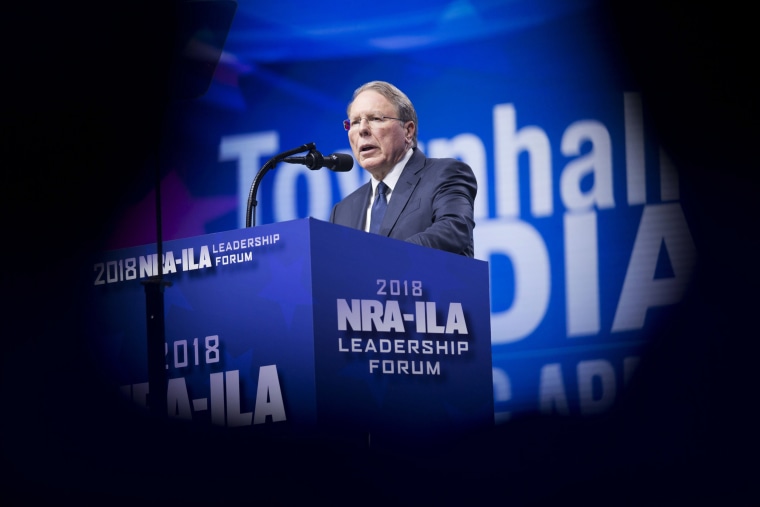A federal judge in Dallas on Tuesday dismissed the National Rifle Association's bid to seek bankruptcy protection and reorganize in Texas, finding that the petition was filed to gain an "unfair litigation advantage" in a lawsuit brought by the New York attorney general's office.
New York Attorney General Letitia James sued the NRA last year seeking to dissolve the gun rights advocacy group and accusing top executives of "years of illegal self-dealings" that funded a "lavish lifestyle." The NRA has called the suit an "unhinged and political attack."
"The question the Court is faced with is whether the existential threat facing the NRA is the type of threat that the Bankruptcy Code is meant to protect against. The Court believes it is not," U.S. Bankruptcy Judge Harlin Hale wrote in a 38-page decision.
The NRA filed for Chapter 11 bankruptcy protection in January at the direction of its CEO, Wayne LaPierre — unbeknownst to some members of the organization's board of directors and other top officials.
"What concerns the Court most though is the surreptitious manner in which Mr. LaPierre obtained and exercised authority to file bankruptcy for the NRA. Excluding so many people from the process of deciding to file for bankruptcy, including the vast majority of the board of directors, the chief financial officer, and the general counsel, is nothing less than shocking," wrote Hale, of the Northern District of Texas.
The ruling paves the way for the New York case to proceed.
"The @NRA does not get to dictate if and where it will answer for its actions, and our case will continue in New York court," James tweeted. "We sued the @NRA to put an end to its fraud and abuse, and now we will continue our work to hold the organization accountable."
In a statement, LaPierre said: "Although we are disappointed in some aspects of the decision, there is no change in the overall direction of our Association, its programs, or its Second Amendment advocacy.
"We remain an independent organization that can chart its own course, even as we remain in New York to confront our adversaries," he added. "The NRA will keep fighting, as we've done for 150 years."
Sen. Bob Menendez, D-N.J., mocked the group on Twitter after the ruling, using the refrain LaPierre has used after numerous mass shootings. "Oh no, thoughts and prayers...," he tweeted.
Testifying in a weekslong trial in Dallas that concluded last week, LaPierre acknowledged that he had failed to file required conflict-of-interest disclosure forms, including disclosing trips aboard a yacht owned by a Hollywood producer whose company had done business with the nonprofit.
LaPierre described one of the trips as "a security retreat" because he was frightened for his safety in the months after a gunman killed 20 children and six educators at Sandy Hook Elementary School in Newtown, Connecticut, in 2012.
"I remember getting there going, 'Thank God I'm safe, nobody can get me here.' And that's how it happened. That's why I used it," LaPierre testified in a deposition.
James' suit alleges that LaPierre and other executives used the corporation as a "personal piggy bank" and that millions of dollars from NRA reserves were used on trips for them and their families and to pay for private jets and expensive meals. LaPierre is also accused of having spent more than $500,000 on eight trips to the Bahamas over three years, securing luxury black car services, paying for hair and makeup for his wife and obtaining a post-employment contract from the NRA valued at $17 million.
LaPierre and other officials said that the NRA has been restructuring and trying to correct past problems and that the group, which is chartered in New York and headquartered in Virginia, planned to move to Texas.
In his ruling, Hale noted that "there was a general consensus among the witnesses that, as the NRA has consistently represented to the Court and to its members, the NRA is in its strongest financial condition in years and intends to pay creditors all allowed claims in full."
The solid financial outlook didn't help the NRA's case. "The NRA is a solvent and growing organization using this bankruptcy as a tool to win its dissolution lawsuit, and that is not an appropriate use of bankruptcy," the judge wrote.

